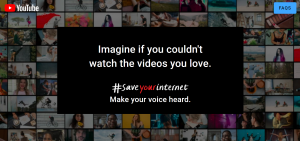
After more than 40 years of operation, DTVE is closing its doors and our website will no longer be updated daily. Thank you for all of your support.
French broadcasters slam YouTube campaign against Article 13
French broadcasters and organisations representing rightsholders have banded together to condemn what they describe as Google and YouTube’s “massive and unprecedented campaign of disinformation” against the EU’s revised copyright directive, currently at the stage of ‘trilogue’ discussions between the European Council, Parliament and the Commission.
In an open letter that thanked French culture minister Franck Riester for having assured them of the support of the French government to see the directive through, some 37 organisations including all the country’s main broadcasters – France Télévisions, TF1, M6 and pay TV outfit Canal+ – condemned the campaign to mobilise opposition to the directive, which they said was motivated solely by self-interest.
The letter said that Google and YouTube’s campaign was “based on the manipulation of users, influencers and the young” and was “unacceptable”.
The group said that Google and YouTube had “once again crossed a red line in abusing their dominant position”.
The group, which also included numerous copyright collecting societies, said that the directive was “essential to re-equilibrate a sharing of value that is currently unequal between the [web] platforms and the culture and media industries” and warned against any weakening of the proposed rules.
“Otherwise, Europe would be admitting its powerlessness and its submission to the GAFAs,” they said, referring to the acronym commonly used in France to refer to Google, Amazon, Facebook and Apple.
The French groups’ condemnation of YouTube follows a series of interventions by Google’s video-sharing unit to attempt to block the implementation of Article 13 of the EU’s proposed copyright legislation, most recently by encouraging its content creators to speak out against rules that it claims would “block the vast majority of uploads from Europe”.
The call to action from creators marked an escalation of YouTube’s campaign following an article by CEO Susan Wojcicki alleging that the “creator economy is under threat” and a letter to creators arguing that the directive “poses a threat to both your livelihood and your ability to share your voice with the world”.
The copyright directive, which was approved by European Parliament in September, will see web companies such as Facebook, Twitter and YouTube forced to pay for the work of artists and journalists that appear on their sites, and use filtering systems to block copyrighted content appearing without authorisation.



